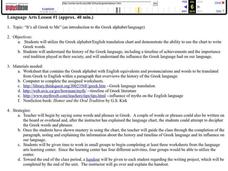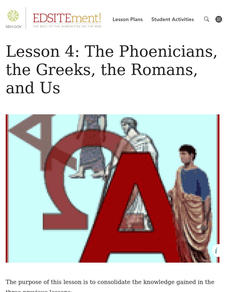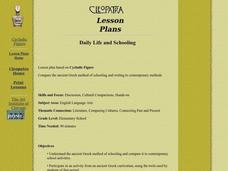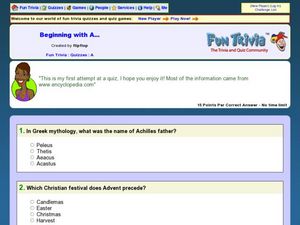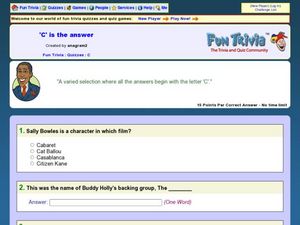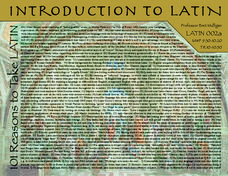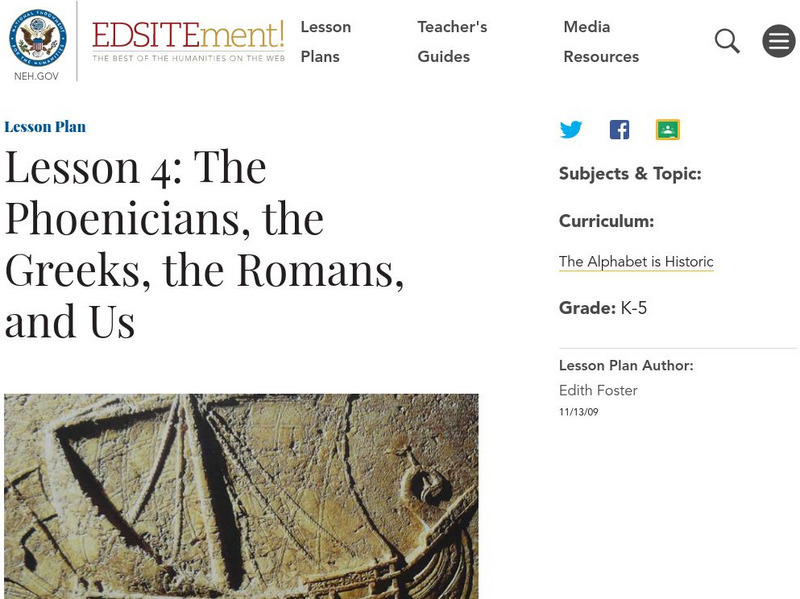National Endowment for the Humanities
The Greek Alphabet: More Familiar Than You Think!
In this Greek alphabet lesson, pupils explore the Phoenician origins to the Greek alphabet. Learners compare Greek letters to current letters and write a paragraph about the life of students in ancient Greece. They also identify...
Curated OER
It's All Greek to Me
Introduce your class to the Greek alphabet and language. Examine how the Greek language influenced the English language. Study the history, timeline of achievements, and the role oral history played in Greece.
National Endowment for the Humanities
Lesson 4: The Phoenicians, the Greeks, the Romans, and Us
Learners review knowledge gained in the three-part unit on the history of the alphabet. Using maps and images, learners consolidate their understanding of ancient Greece, the Romans and the Phoenicians, and their respective impacts...
Curated OER
Daily Life and Schooling
Students compare the ancient Greek method of schooling and writing to contemporary methods and learn the Greek alphabet on wax tablets.
Curated OER
Ancient Refuge in the Holy Land - International Phonetic Alphabet
Students research the uses and symbols of the International Phonetic Alphabet. They complete a worksheet to translate and transcribe phrases of English into the International Phonetic Alphabet.
Curated OER
The History of Writing
The history of written communication can be an interesting addition to history lessons.
Curated OER
Beginning with the A
Here's a terrific way to review historical facts. Learners answer 10 questions related to history, mythology, and more. This is a great way to hone their research skills.
Curated OER
Cracking Codes and Ciphers
Students explore different codes and ciphers including Morse Code, Egyptian Hieroglyphs, and the Alphabet. They discuss how and why codes are used. Students create their own code and message to exchange with classmates.
Curated OER
Ancient Greece
In this ancient Greece worksheet, learners read a factual story giving the basic history of the Minoans and Mycenaeans. Students answer 8 questions.
Curated OER
'C' is the Answer
Use the internet to enhance the research skills of your High schoolers. In this resource, all sorts of questions are posed: everything from questions about famous people, inventions, entertainment, to important dates in history. There...
Curated OER
Hieroglyphics: It's Not Greek To Me! (It's Egyptian)
Students identify different hieroglyphic characters. They spell their name and write a sentence using them. They use online hieroglyphic translators as well.
Newspaper in Education
The Iliad: A Young Reader Adventure
Is The Iliad part of your curriculum? Check out a resource that offers something for those new to teaching the classic and those with lots of experience using Homer's epic. Plot summaries, discussion questions, activities abound in...
Curated OER
Chapter 12 Writing: the ABCs of Language
Providing a thorough presentation on the art of written language (and not just English), this slideshow will open your students' eyes to the sociological and linguistic issues surrounding writing systems, both modern and historical. The...
Curated OER
Introduction To Latin
In this language arts worksheet, students examine the 101 reasons for taking a class in Latin. The syllabus has classical art for background on the cover page.
Curated OER
Colonial Life
In this colonial life worksheet, students read a 1 page article on colonial life, make a Venn diagram that shows how life for colonial children was different from and similar to theirs and discuss what part of colonial life they liked...
National Endowment for the Humanities
Neh: Edsit Ement: The Alphabet Is Historic
Great lesson plans for grades K-2 on the history of the alphabet. Includes guiding question, objectives, and four lessons with activities and assessments. With links to various websites containing information on alphabet history.
National Endowment for the Humanities
Neh: Edsit Ement: Lesson 4: The Phoenicians, the Greeks, the Romans, and Us
For this lesson plan, students will consider Lesson 4: The Phoenicians, the Greeks, the Romans, and Us. Worksheets and other supporting materials can be found under the Resources tab.
National Endowment for the Humanities
Neh: Edsit Ement: Lesson 3: The Roman Alphabet Is Our Alphabet
In this lesson plan, students will consider Lesson 3: The Roman Alphabet is our Alphabet. Worksheets and other supporting materials can be found under the Resources tab.



